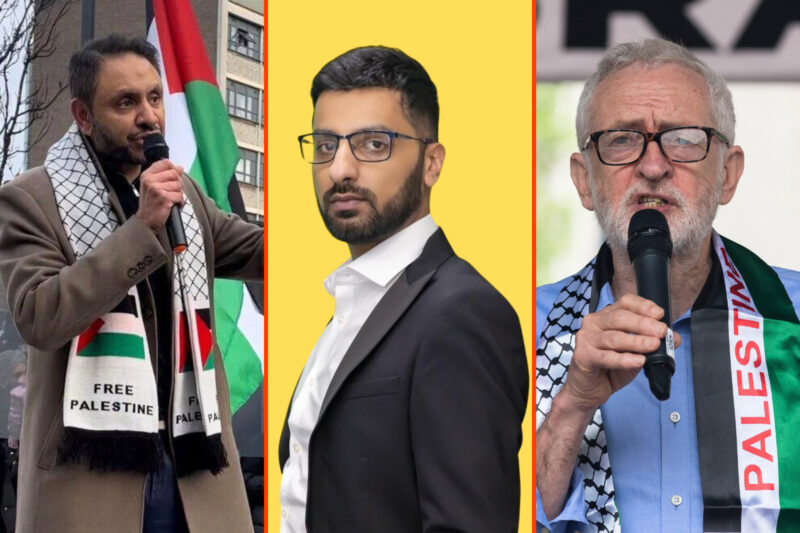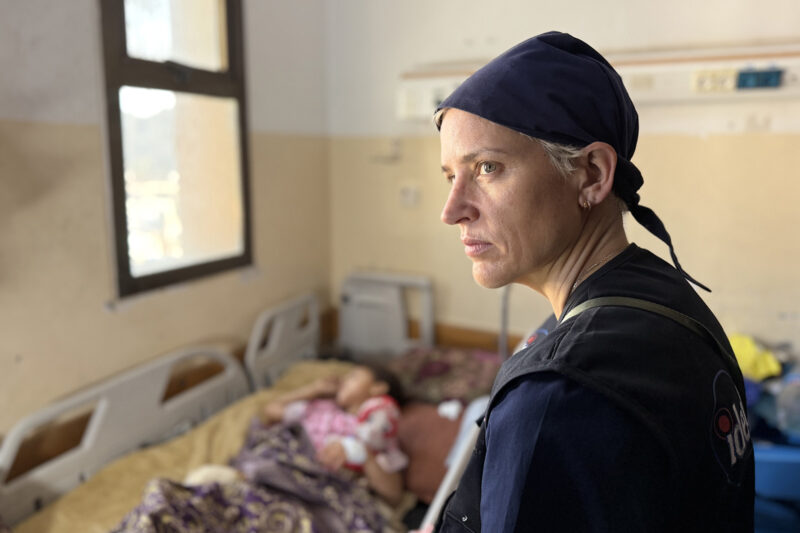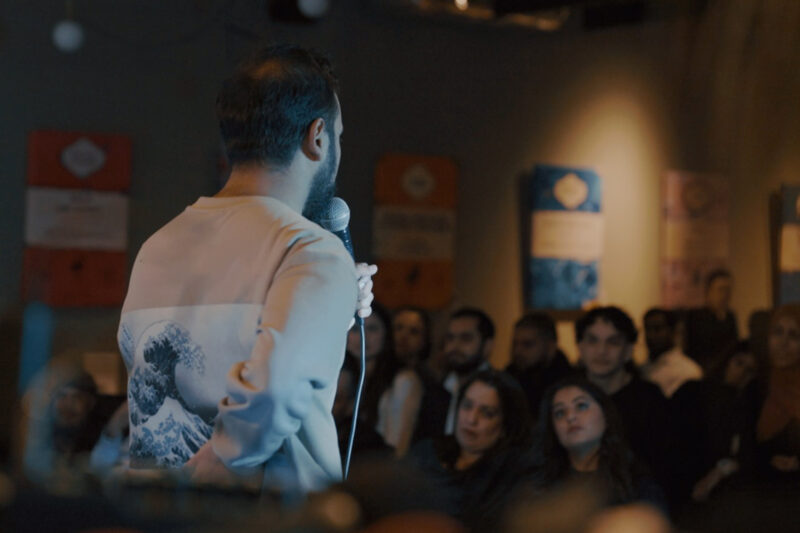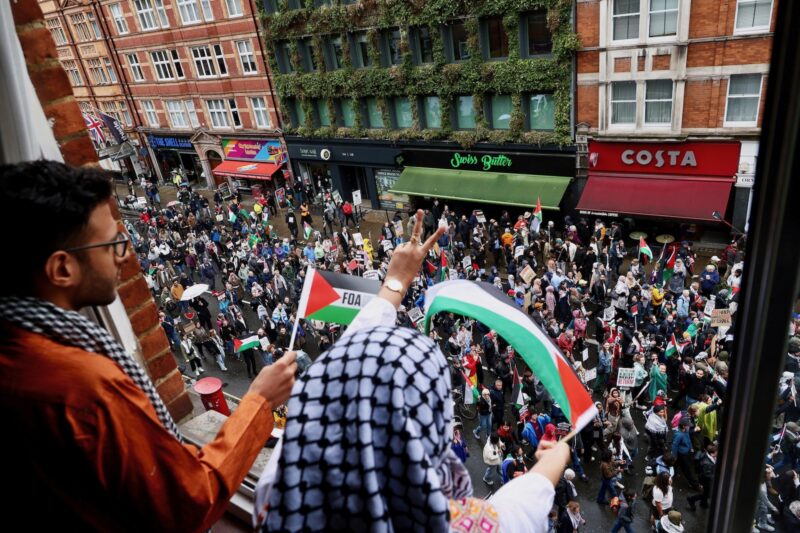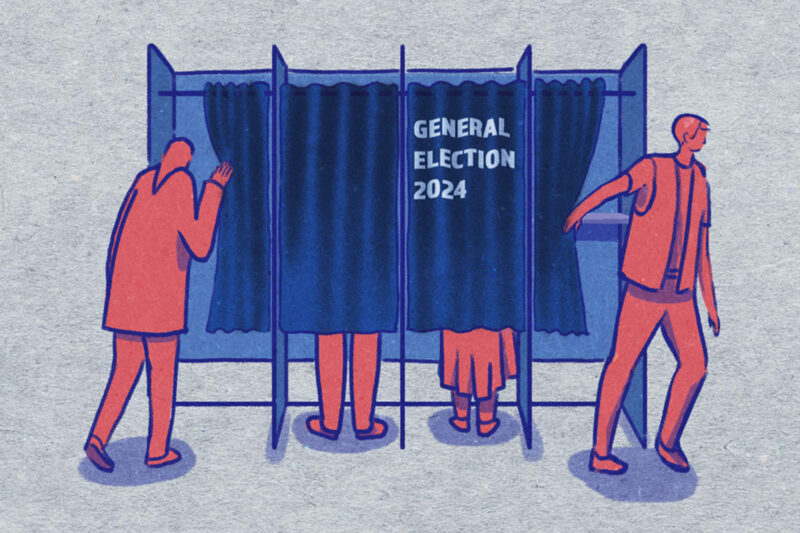Hackney’s Gaza camp is gone. But it may have sown the seeds for divestment
BDS campaigners in east London thought their camp would last 24 hours. It was there for two months — without toilets. Here’s what it achieved
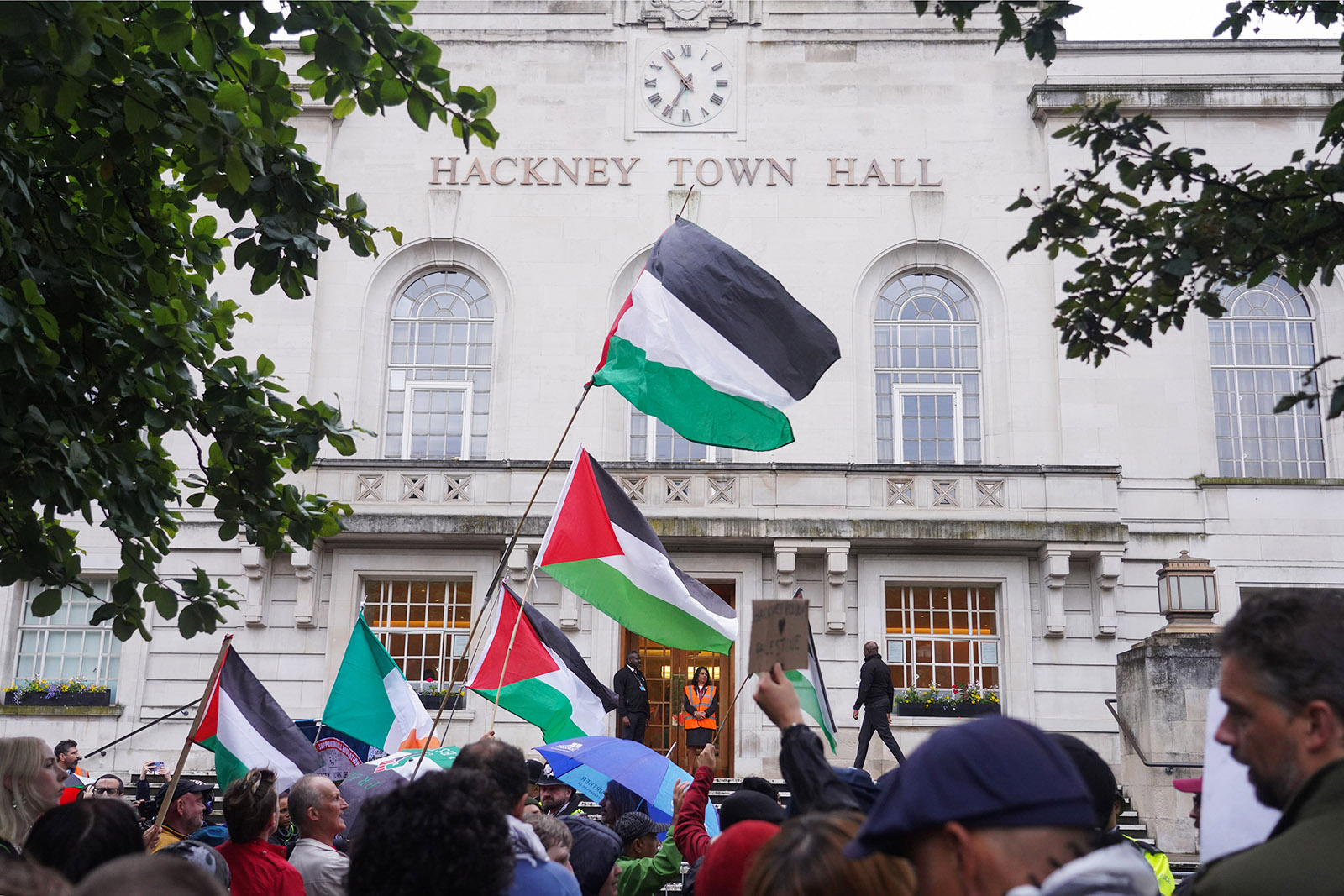
Nora Hassanien has worked in some of the world’s worst war zones.
Her job as an aid worker over the past 13 years has taken her to Syria, Afghanistan, Iraq and Yemen. In March, she returned from six months on the Egypt-Gaza border with Save the Children, responding to the crisis caused by Israel’s bombardment.
But on 9 July, Hassanien’s humanitarian work took her back home to Hackney in east London, to the more prosaic surroundings of a town hall pensions committee meeting.
Hassanien, whose mother was born and raised in Gaza before moving to the UK to work for the NHS, has lost more than 100 family members and friends in the conflict. At the meeting, she spoke of her relatives being forced to flee “so-called safe zones, which were never safe”.
“Since October, my phone has been flooded with stories and images of the most unimaginable suffering,” she told the committee.
“My uncle, who worked in an emergency ward, described children dying in his arms from the pain of being operated on without an anaesthetic. Another uncle described pulling his best friend from under the rubble.
“My mum’s cousin was killed with his wife, four children and 16 family members at the start of the crisis from one blast. This blast to their house was so severe that parts of their bodies flew into my family’s home and the damage was so extensive that the bodies of two of their children were never recovered.”
Hassanien’s speech was part of a deputation by the Palestine Solidarity Campaign (PSC) calling on Hackney council to divest from companies aiding Israel’s attacks on Gaza. Through its pension funds, the Labour-led authority — an accredited “borough of sanctuary” — has millions of pounds invested in companies operating in occupied Palestine, as well as Elbit Systems, Israel’s largest weapons manufacturer.
“When I learned the council invests in companies that manufacture the weapons that are currently raining down on my friends, family and colleagues in Gaza and other war zones around the world I have worked in, I was sickened and ashamed,” Hassanien said.
She, like many others, learned about these investments only thanks to an encampment set up by protesters outside Hackney Town Hall.
Taking inspiration from the pro-Palestine student camps that sprung up at universities around the world in the wake of 7 October, on 9 May a group of local Boycott, Divestment and Sanctions (BDS) campaigners decided to pitch up — not on a private campus but in a busy public square beside a main road. This would be a challenge and they knew it; the aim was to stay for 24 hours, maybe 48. In the end, the camp was there for two months, with shift patterns and rotas. More than 100 people stayed the night at least once, with many getting up early to go to work.
Organisers wound up the camp on the day of the meeting, saying it was time to “change tactics”. By that time, they estimate, thousands of people had dropped by to show their support — including newlyweds who had got married at the town hall.
“It’s a really remarkable thing that we did,” said Heather Mendick, who helped set up the camp. “Everyone talks about the student encampments, but they are on campuses. We were in a town centre. From when Wetherspoon’s closes at midnight to when Tesco opens at 6am we had no toilet.”
She added: “Being there for 24 hours [a day] makes a difference to how people interact with you. By the time they’ve walked past you four or five times they want to come over and chat. Others saw us from the bus and said they wanted to come back and chat. So many more people know what’s going on now.”
Anna McKibbin, who works at a local theatre, not only stopped to chat when she walked past the camp — she ended up joining it, doing regular late night and early morning shifts.
“By the end of the two months I felt drained, but also extremely encouraged,” she said. “I felt really moved by the way people rallied around. It was the only place that was making sense to me at times amid an ongoing genocide.
“People we spoke to were overwhelmingly in support of our demands, but a lot of people were surprised Hackney [council] had ever been involved with these companies. Our presence made a lot of people more aware.”
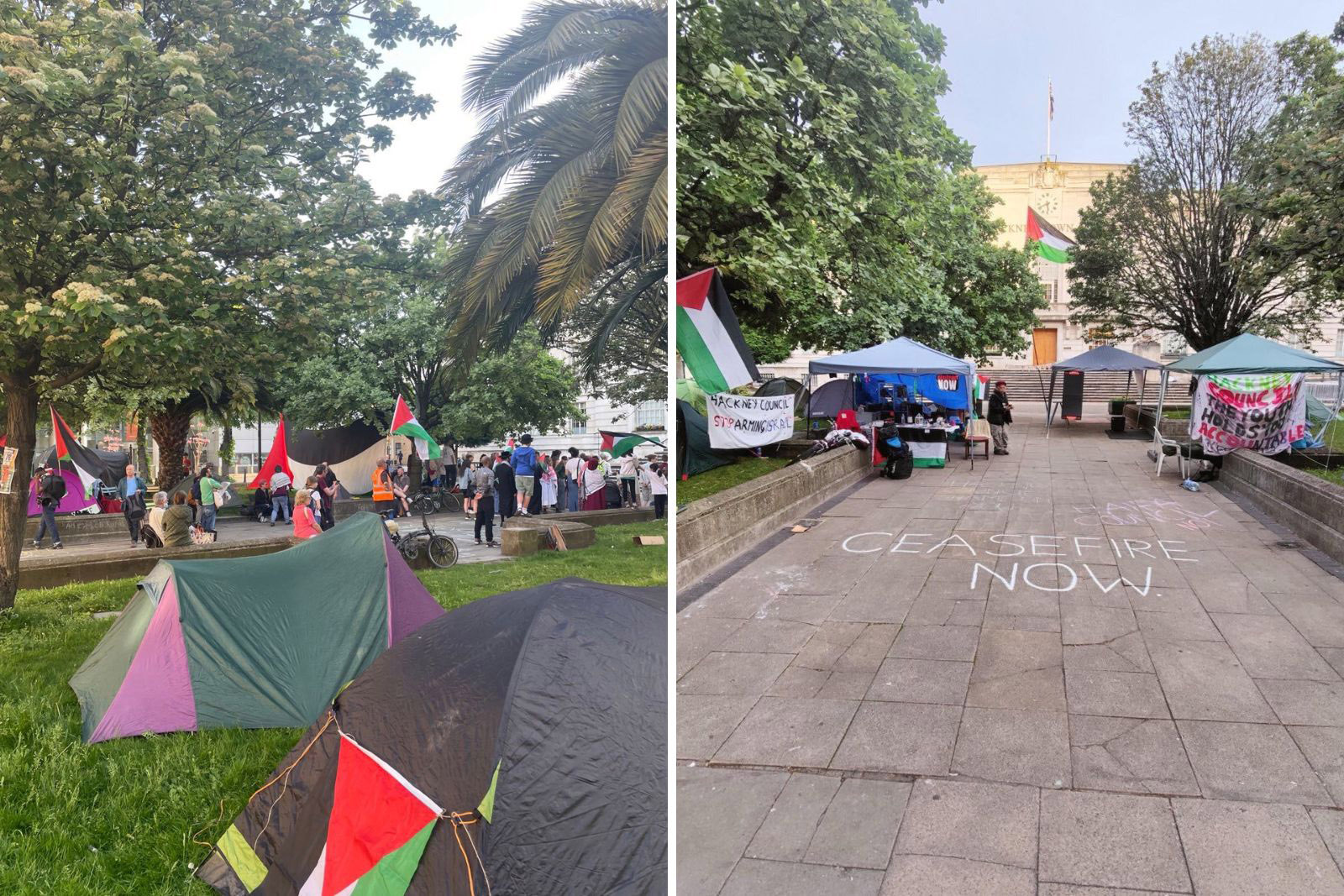
Given the location, a lot of the people passing the camp each day were Hackney council’s own staff — the people whose pensions are tied up in these funds. Many, say the campaigners, didn’t know what their investments were supporting, and backed the protesters’ aims.
Those conversations may have had an impact. This week a poll of 274 workers by Hackney Unison, the largest union within the council, found that 90% of respondents didn’t want their pensions invested in arms or weapons manufacturers. Some 85% were also against investments in companies that profit from human rights abuses.
Hackney is not alone when it comes to these investments. PSC estimates that most local government pension schemes in England and Wales have investments totalling £1.1bn in firms supplying weapons or systems to Israel. Universities do too, hence the student encampments.
The amount Hackney itself has invested in companies on the BDS list is disputed. Campaigners put the figure at more than £30m, with investments in everything from arms manufacturers such as Raytheon and BAE Systems to household names such as Motorola and Airbnb that have been accused of supporting and benefiting from illegal Israeli settlements. The council says it’s £3.5m, citing the more restrictive list of companies produced by the Office of the UN High Commissioner for Human Rights.
BDS, a global movement that formed in 2001, targets public bodies and private companies accused of aiding what it calls “Israeli apartheid”. It has had successes: Palestine Action has shut down Elbit factories in the UK, universities have agreed to divest, and global corporations have taken financial hits. It has also received pushback from Israel’s supporters, and in the UK the Tory government unsuccessfully tried to introduce an “anti-boycott bill” before its election wipeout.
In Hackney, the motion to the pensions committee was opposed in a deputation from Hackney Friends of Israel, led by former Tory councillor Linda Kelly, and arrests were made when counter-protesters turned up at the camp beforehand.
But Israel’s onslaught on Gaza has increased support for boycotts, divestment and sanctions, including in the new-look House of Commons. The Green party, which won four seats in the general election, supports BDS, and five pro-Palestine independents — including Jeremy Corbyn — have this week called for David Lammy, the foreign secretary, to consider sanctioning Israel.
Corbyn told Hyphen: “Boycotts, divestments and sanctions helped end apartheid in South Africa. They will be essential to ending the apartheid regime in Israel, too. If the government was serious about respecting international law, it would immediately distance itself from the previous government’s attacks on BDS campaigners.”
The campaign for divestment, as well as a motion being heard on 24 July to review the borough’s twinning with Haifa, the Israeli city home to Elbit, also has cross-party support within the council. The Green party and the Hackney Independent Socialist Group, set up by Labour councillors who resigned over the party’s stance on Gaza, have both backed it.
Diane Abbott, the Labour MP for the north of the borough, told Hyphen she was “a strong supporter of the aims” of the campaign.
“In the months of military operations, 40,000 people have been killed, about half of them children,” she said. “There is now widespread disease in Gaza and starvation is a reality. So there should be no investment which in any way supports or aids these massacres.”
Even Hackney’s Labour mayor Caroline Woodley has said she supports ethical divestment.
Despite this, Hackney council rejected the PSC’s request for divestment. Kam Adams, the committee chair, replied to Hassanien’s speech by reading from a prepared statement saying divestment would require disposing of the whole investment fund and finding another, which would cost £2.1m in the first year. He said this would “risk financial detriment” to the Hackney Pension Fund and “would therefore breach Law Commission guidance”.
The campaigners say this is wrong — and had pre-empted it by drafting, with the help of an ethical investment expert, a leaflet outlining how divestment could be done. These were handed out to councillors at the meeting, but largely ignored.
“It was really frustrating,” Hassanien told Hyphen. “We made a strong case and brought an investment specialist, and she wasn’t asked a single question.”
The Greens’ local co-leader Alastair Binnie-Lubbock, who has long campaigned on divestment — and spent a night at the camp — told Hyphen the council was “making excuses”.
He added: “We are going to keep the pressure up. We are not going to go away just because the camp has gone.”
The effort has started to pay off in other ways, too, though. The council has committed to a wider staff survey, with a response pencilled in for September.
“The results of this will be used to help inform the future development of the fund’s responsible investment policy,” a council spokesperson told Hyphen.
If the Unison poll is anything to go by, the council’s hand could be forced. The camp may be gone, but the campaign, which goes on, has been strengthened by it.
“Things are different from when we started the camp,” said Mendick. “Given we’ve had this stance for years, this has really moved things.”
Hassanien added: “It was a really beautiful and inspiring piece of protest. People who are so upset seeing what is happening in Palestine felt the need to spend cold, often rainy nights sleeping in a tent outside the town hall because they were feeling really unheard.
“Months and months of protesting and letter-writing seem to have done nothing, with no real reaction from the council. So they said: ‘We are going to sleep outside to force them to at least have a conversation with us.’”
 Newsletter
Newsletter


